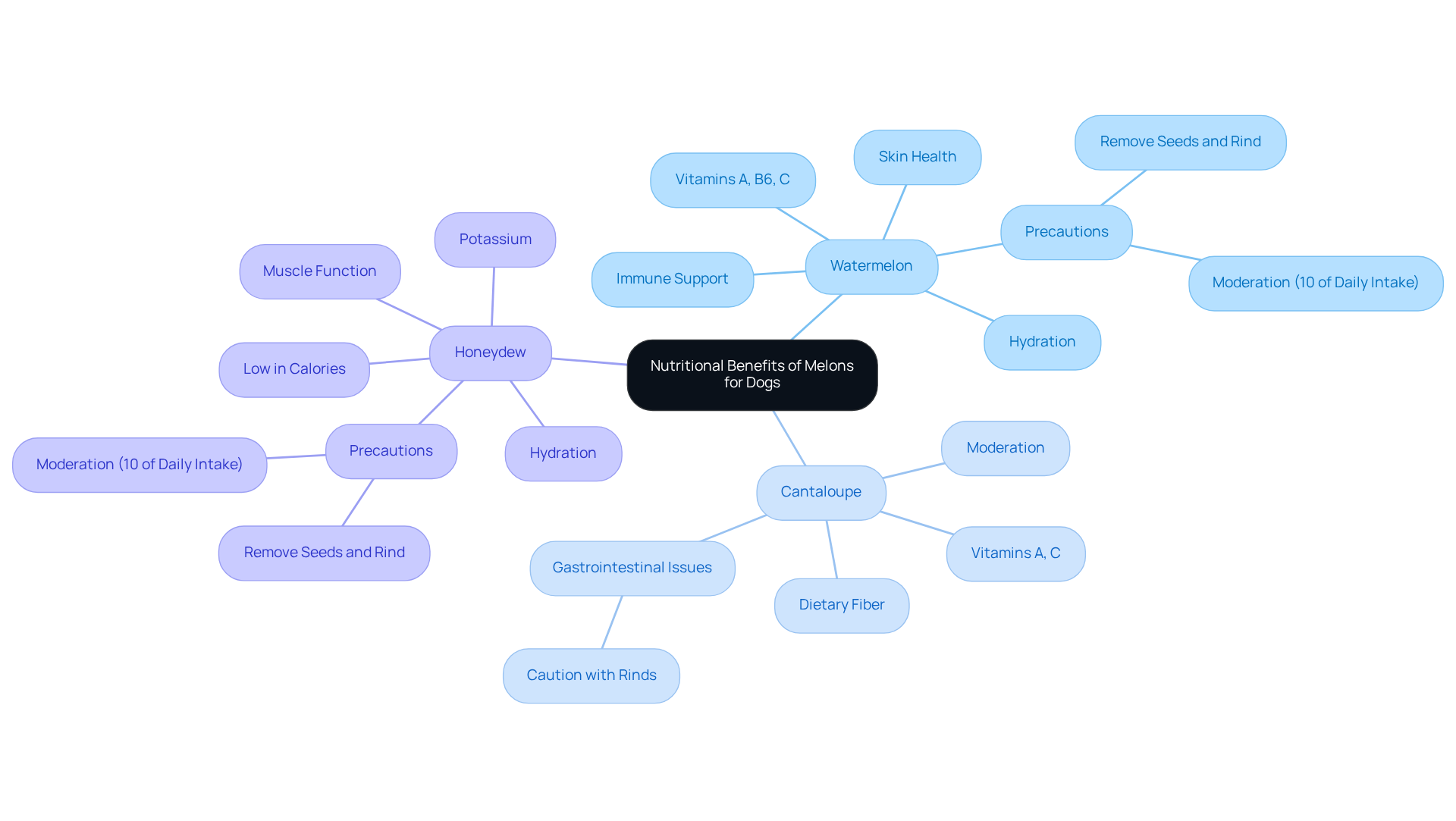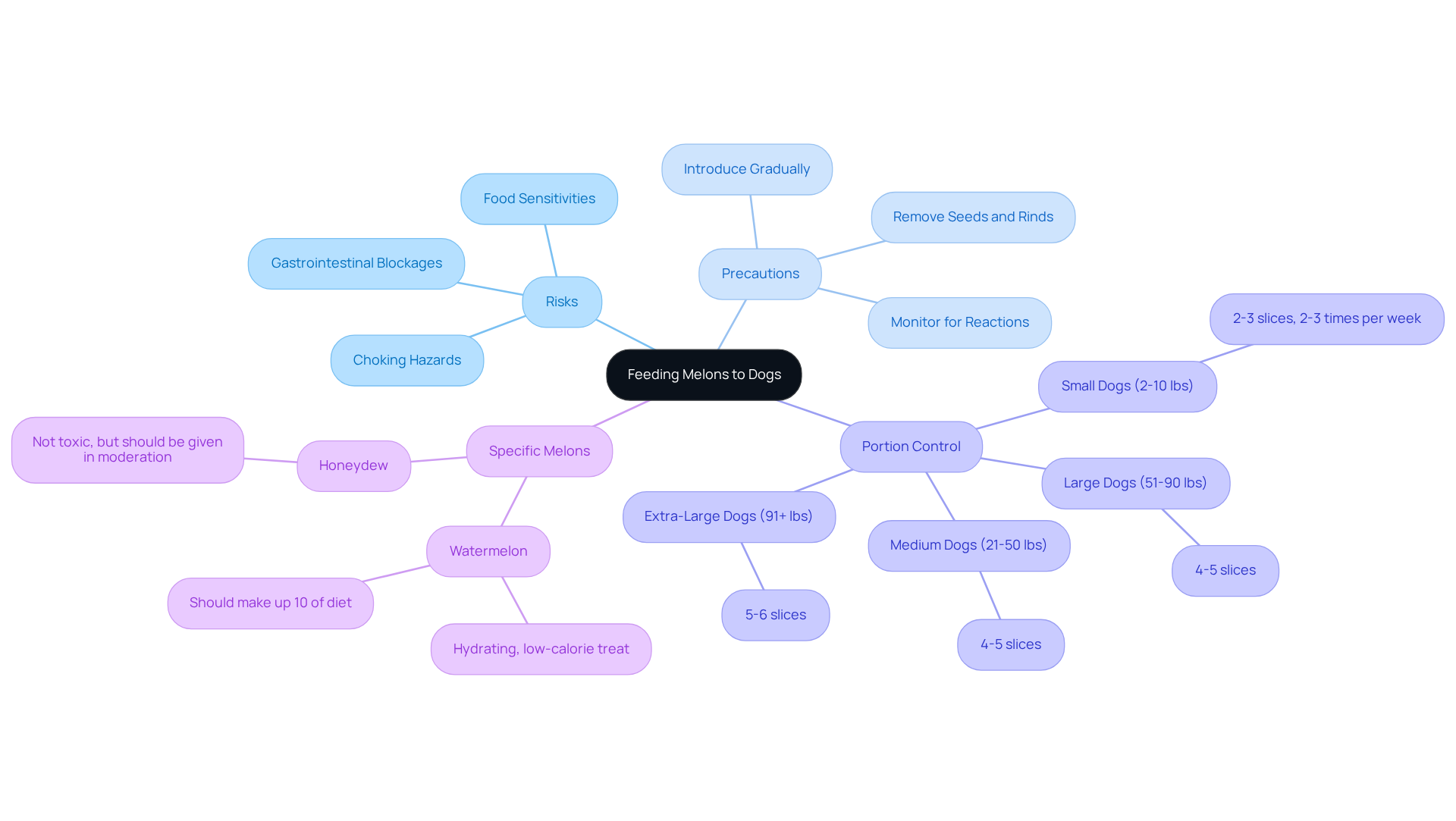Can Dogs Have Melon? Understanding Safe Options and Risks
Overview
As a loving pet owner, you want to provide the best for your furry family members. Did you know that dogs can safely enjoy certain types of melons? Watermelon, cantaloupe, and honeydew can be delightful treats when prepared correctly. Just remember to remove the seeds and rinds, and ensure that these tasty bites make up no more than 10% of their daily diet.
These melons are not just delicious; they offer hydration and essential vitamins that can benefit your pet’s health. However, it’s important to be mindful of necessary precautions to prevent choking and digestive issues. By taking these simple steps, you can ensure that your dog enjoys a safe and healthy treat.
At Adventure Den, we understand that your pet’s well-being is your top priority. We encourage you to explore these nutritious options, knowing that you are making informed choices for your beloved companion. Together, let’s create a nurturing environment where your pets can thrive!
Introduction
The vibrant colors and refreshing taste of melons make them a summer favorite, not just for us, but potentially for our furry family members as well. Understanding which types of melons are safe and beneficial can enhance your pet’s diet while providing essential nutrients. But the question lingers: can dogs truly enjoy this juicy treat without risk? By exploring the safe options, nutritional benefits, and necessary precautions, you can make informed choices that keep your beloved companions healthy and happy.
Define Safe Melons for Dogs
When it comes to choosing melons for your furry family members, you should consider if dogs can have melon safely. The most commonly recommended options include:
- Watermelon
- Cantaloupe
- Honeydew
Watermelon stands out with its impressive water content, making it a refreshing treat, especially during those warm summer months. Cantaloupe is not only low in calories but also high in fiber and rich in vitamins A and C, which are beneficial for your dog’s overall health.
Honeydew also offers hydration, but it should be fed sparingly due to its higher sugar content, particularly for dogs that may be overweight or have diabetes. Always remember to remove seeds and rinds, as these can pose choking hazards or lead to digestive issues. Veterinarians recommend that rewards, including all varieties of fruit, should make up no more than 10% of your dog’s daily diet to ensure balanced nutrition.
It’s also important to note that certain canines may experience sensitivities or mild allergic responses to fruits, so keep an eye out for any negative effects. By understanding which melons are safe and how to prepare them properly, you can enhance your pet’s diet with nutritious and hydrating options while ensuring their safety, including knowing if dogs can have melon. Together, let’s create a nurturing environment for your beloved pets, ensuring they enjoy their treats while staying healthy.

Explore Nutritional Benefits of Melons
When considering what treats to share, many wonder if dogs can have melon, as melons are not only a delightful treat for your furry family members but also a powerhouse of essential nutrients that can significantly benefit their health. Watermelon, in particular, shines with its abundance of vitamins A, B6, and C, which are crucial for supporting immune function and promoting healthy skin. Just remember, when considering if dogs can have melon, it’s important to ensure that watermelon does not exceed 10% of your dog’s daily caloric intake.
Cantaloupe offers similar benefits, providing high levels of vitamins A and C, along with dietary fiber that aids digestion. However, pet owners should be cautious of potential gastrointestinal issues that can arise from feeding cantaloupe rinds. Honeydew also contributes potassium, which is essential for maintaining proper muscle function and hydration. Be sure to prepare it by removing seeds and rind to prevent choking hazards and digestive issues.
With a water content of about 90%, these fruits are excellent for keeping dogs hydrated, especially during the warmer months. By incorporating small portions of these melons into your dog’s diet, you can explore whether dogs can have melon to enhance their overall well-being and vitality. Additionally, honeydew can serve as an occasional indulgence or meal enhancer, adding a touch of variety to your dog’s meals. Your pet deserves the best, and with these nutritious options, you can nurture their health and happiness.

Identify Risks and Precautions When Feeding Melons
While melons can be a nutritious treat for your furry family members, it’s important to ask, can dogs have melon, and be aware of certain risks and precautions. Always remove the seeds and rinds before offering this delightful fruit, as these parts can pose serious choking hazards or lead to gastrointestinal blockages. It’s essential to recognize that some dogs may have sensitivities to new foods. Therefore, introducing melons gradually is advisable, monitoring for any adverse reactions such as diarrhea or upset stomach.
Portion control is crucial; excessive melon consumption can lead to digestive issues due to its high fiber and sugar content. For instance, watermelon, while hydrating, should only make up about 10% of your dog’s diet to prevent obesity or diabetes. Medium-sized canines can safely enjoy 4-5 slices of watermelon, while small ones should only have a couple of small pieces. Additionally, Dr. Paola Cuevas notes that honeydew isn’t toxic to dogs but should be given in moderation.
By adhering to these precautions, you can safely share the joys of melons with your beloved pets, and you might ask, can dogs have melon, ensuring a nurturing environment where they can thrive and enjoy their treats.

Conclusion
Understanding which melons are safe for your furry family members and how to incorporate them into their diet is essential for pet owners who want to provide healthy, hydrating treats. By focusing on options like watermelon, cantaloupe, and honeydew, your dogs can enjoy the nutritional benefits these fruits offer while staying safe. Proper preparation, including the removal of seeds and rinds, is crucial to prevent choking hazards and digestive issues.
The impressive hydration and nutrient content of melons cannot be overlooked. These fruits are packed with vitamins and minerals that can enhance a dog’s health. Watermelon, in particular, is noted for its high water content and essential vitamins, while cantaloupe and honeydew also provide valuable nutrients. However, moderation and careful monitoring are key, as excessive consumption can lead to digestive problems or other health issues.
Ultimately, incorporating melons into your dog’s diet can be a delightful way to enhance their nutrition, but it requires attention to safety and portion control. By being informed about the risks and benefits, you can create a nurturing environment that supports your furry friends’ health and happiness. Embracing these wholesome treats can lead to joyful moments shared between pets and their owners, reinforcing the bond that makes pet ownership so rewarding.
Frequently Asked Questions
Which types of melons are safe for dogs to eat?
The safe melons for dogs include watermelon, cantaloupe, and honeydew.
What are the benefits of watermelon for dogs?
Watermelon is beneficial for dogs due to its high water content, making it a refreshing treat, especially during warm weather.
How does cantaloupe contribute to a dog’s health?
Cantaloupe is low in calories, high in fiber, and rich in vitamins A and C, which are beneficial for a dog’s overall health.
Is honeydew safe for dogs, and are there any precautions?
Honeydew is safe for dogs but should be fed sparingly due to its higher sugar content, especially for dogs that are overweight or have diabetes.
What precautions should be taken when feeding melons to dogs?
Always remove seeds and rinds from melons before feeding them to dogs, as these can pose choking hazards or lead to digestive issues.
How much of a dog’s diet should consist of fruits like melons?
Veterinarians recommend that fruits, including melons, should make up no more than 10% of a dog’s daily diet to ensure balanced nutrition.
Can dogs have allergic reactions to melons?
Yes, some dogs may experience sensitivities or mild allergic responses to fruits, so it’s important to monitor for any negative effects after feeding melons.







